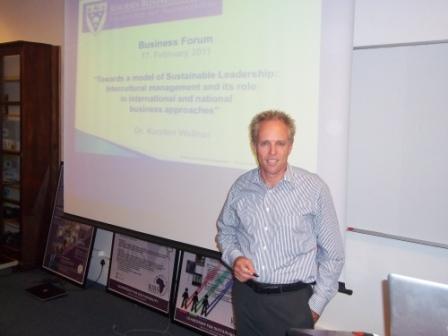
Dr Karsten Wellner, founder of strategic and executive consulting firm GEC Consulting, and a regular guest lecturer at the University of Stellenbosch Business School, was at Rhodes Business School last week lecturing students about intercultural management and how living in a rainbow nation gives South African’s the edge.
He also gave a presentation at the second Business Forum meeting of 2011, speaking on the topic Towards a Model of Sustainable Leadership: intercultural management and its role in international and national business approaches”.
Dr Wellner is an extremely polished and amusing speaker, who managed to get vital points across with a good dollop of humour to wash them down. He opened by telling the audience that, as far as he was concerned, South African business leaders are extremely well suited to internationalising their business. To elaborate on this statement, he gave a succinct and accessible breakdown of the definitions and analysis of the concept of Culture, on the basis that managing a business in a foreign country requires business leaders to have an in-depth awareness of the cultural, legal and political systems within which they are operating.
Culture is influenced by a number of things, including religion, social structure, language (both spoken and unspoken), education and economic philosophy (whether command or market driven). Dr Wellner pointed out that time perceptions also differ, as does non-verbal behaviour and ideas of personal space.
While language is one of the most conspicuous stamps of culture, and English is the most popular second language worldwide, relying on English alone within a multicultural organisation can place your business at a distinct disadvantage. For example, should one be operating in a region with a high context language, such as in China, there is a high dependency on unique local knowledge, which could result in an unprepared foreigner being unable to gain full value for his business?
Religion, norms and values differ widely too; Dr Wellner used the example of the Saudi's having their holy day on a Friday to illustrate this point. The successful business will accept the need for local knowledge, and will adapt as required. The example of MacDonalds in India, where 800 million Hindus make up the bulk of the population, is a good example. In a country where the cow is a holy animal, MacDonalds departed from their usual model of standardisation and serve only chicken products.
So, what does it take to be a successful international manager, and why does he think that South Africans have a head start? International managers have to be experts in managing cultural differences abroad, and, with our rainbow nation, South African managers are already well versed in managing these differences here at home, in light of Employment Equity.
The challenges of managing the myriad of cultures which exist in our own country echo those to be found in the international sphere, and the resulting skill-set places South Africans in an advantageous position with regard to overseas business management.
Dr Wellner finished his talk by giving some advice gleaned from his own twenty years in the international pharmaceutical industry. When interacting with other cultures, be open, try to understand and do not judge them for being different. If you do judge, you will not succeed.
